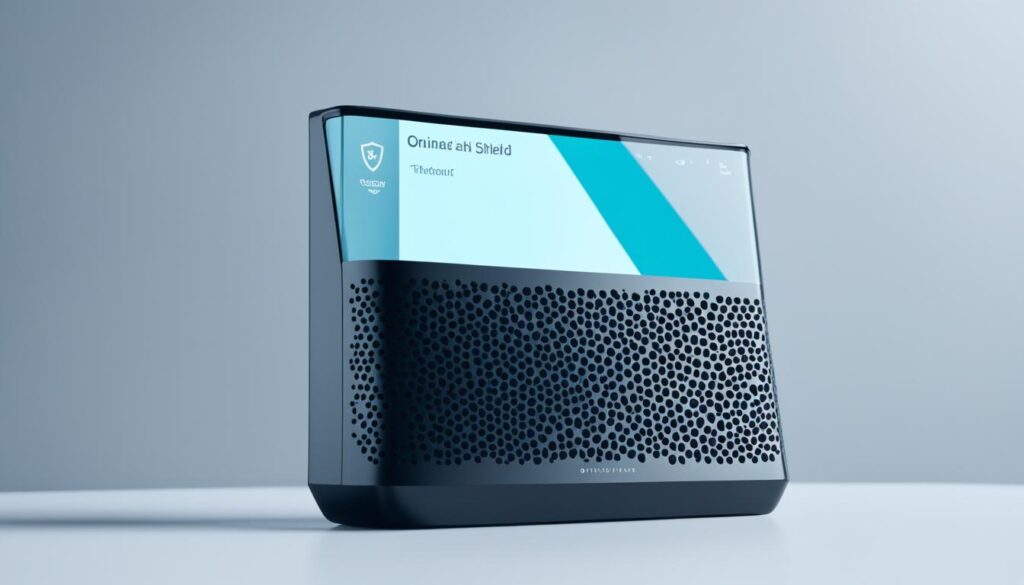In today’s fast-paced digital age, more and more professionals are embracing the flexibility and convenience of remote work. While working from home offers numerous benefits, it also presents unique challenges, especially when it comes to cybersecurity. As a remote worker, it’s essential to prioritize the security of your home office and devices to protect yourself and your company from potential threats.
By implementing robust cybersecurity practices, remote workers can mitigate risks and ensure a safe working environment. This section will provide you with important tips and strategies to safeguard your home office and devices, ensuring the protection of your sensitive data and maintaining the integrity of your work.
Key Takeaways:
- Invest in comprehensive antivirus and internet security software to protect your home office and devices from cyber threats.
- Establish boundaries and prevent family members from accessing your work devices.
- Use a Virtual Private Network (VPN) to establish secure connections with your company’s network.
- Strengthen the security of your home Wi-Fi network by setting a strong password and enabling network encryption.
- Regularly update your devices’ software and firmware to ensure you have the latest security patches and fixes.
Importance of Antivirus and Internet Security Software
When it comes to remote work security, investing in antivirus software and internet security solutions is crucial. These comprehensive software suites provide essential protection against cyber threats, ensuring the safety of your home office and devices. With the rise of remote work, the need for robust cybersecurity measures has become more pressing than ever.
Antivirus software plays a key role in safeguarding your system from malware, viruses, and other malicious threats. It scans and detects potential risks, preventing them from wreaking havoc on your devices. By regularly updating the software, you can ensure that it remains equipped with the latest virus definitions, enhancing its ability to identify and neutralize emerging cyber threats.
Similarly, internet security software acts as a first line of defense against online hazards. It provides protection against phishing scams, ransomware attacks, and other forms of breaches that can compromise your sensitive data. With advanced features like real-time threat detection and zero-day attack prevention, these software solutions offer a multi-layered approach to safeguarding your remote work environment.
By deploying antivirus and internet security software, remote workers can minimize the risks associated with cyber threats. These tools provide peace of mind, allowing professionals to focus on their work without the constant worry of falling victim to malicious online activities.
Benefits of Antivirus and Internet Security Software:
- Automatic protection against malware and viruses.
- Prevention of phishing scams and data breaches.
- Real-time threat detection and removal.
- Regular updates to combat emerging cyber threats.
- Multi-layered security approach for comprehensive protection.
Remember, cybersecurity is a continuous effort, and investing in reliable antivirus and internet security software is an essential step in protecting your remote work environment from potential cyber threats.
Quote: “Cybersecurity is a continuous effort, and investing in reliable antivirus and internet security software is an essential step in protecting your remote work environment from potential cyber threats.”
| Key Features | Antivirus Software | Internet Security Software |
|---|---|---|
| Malware and virus protection | ✓ | ✓ |
| Phishing scam prevention | ✓ | ✓ |
| Data breach protection | ✓ | ✓ |
| Real-time threat detection | ✓ | ✓ |
| Zero-day attack prevention | ✓ | ✓ |
Investing in reliable antivirus and internet security software is a proactive approach to protect your remote work environment. With robust protection and regular updates, you can defend your home office and devices against cyber threats, ensuring a secure and productive remote work experience.

Protecting Work Devices from Family Members
When working from home, it’s important to establish boundaries and ensure the security of your work devices. Family members, especially children, may unknowingly access sensitive files or accidentally compromise the security of your work environment. By implementing a few key measures, you can protect your work devices from unauthorized access and maintain the confidentiality of your work.
Encourage Device Security and Password Protection
One of the best ways to keep your work devices secure is by setting strong passwords and encouraging family members not to share or use them. Emphasize the importance of password protection and educate your household members about potential risks associated with unauthorized access to your work laptops, mobiles, and other devices.
Here are some device security practices to implement:
- Set up a unique, strong password for all work devices.
- Enable biometric authentication, such as fingerprint or facial recognition, wherever possible.
- Regularly update passwords to ensure maximum protection against unauthorized access.
Raising Awareness about Potential Risks
“Prevention is better than cure.”
– Unknown
By educating your family members about the potential risks of using your work devices, you can create a safer environment. Emphasize the importance of not downloading unfamiliar software, clicking on suspicious links, or opening email attachments from unknown sources. Encourage them to consult with you before using or accessing any work-related materials to avoid potential security breaches.
Secure Work Data Separately
To further protect your work devices, consider keeping work-related files and applications separate from personal files. By creating separate user accounts or using encrypted folders, you can ensure that family members only have access to personal files and applications, reducing the risk of accidental deletion or unauthorized access to work-related data.
| Best Practices to Protect Work Devices from Family Members |
|---|
| Set strong and unique passwords for work devices. |
| Educate family members about the potential risks and consequences of unauthorized access. |
| Enable biometric authentication for added security. |
| Create separate user accounts or encrypted folders for work-related files and applications. |

By implementing these strategies, you can maintain the security and privacy of your work devices, ensuring that family members respect your boundaries and safeguard the sensitive information stored on these devices.
Ensuring Secure Remote Connections with VPN
As remote work becomes increasingly common, it is vital to prioritize the security of your remote connections. One effective way to do this is by utilizing a Virtual Private Network (VPN). A VPN creates a secure and encrypted connection between your device and your company’s network, ensuring the privacy and protection of your data.
By using a VPN, you can hide your IP address, making it difficult for hackers or unauthorized individuals to trace your online activities. This provides an additional layer of security when accessing sensitive company resources or communicating with colleagues.
Key benefits of using a VPN for remote connections include:
- Enhanced privacy: VPNs use encryption algorithms to safeguard your data, preventing it from being intercepted or accessed by cybercriminals.
- Bypassing geographical restrictions: VPNs allow you to access region-restricted content or websites by masking your location and assigning you a virtual IP address from a different location.
- Secure remote work: VPNs enable remote workers to securely access company networks and resources, including sensitive files, databases, and proprietary software.
Employers should educate their employees about the importance of VPN security and provide guidelines for its proper usage. It is essential to stress the significance of regularly updating VPN passwords and connecting to the VPN only when necessary to minimize potential risks.

Strengthening Home Network Security
In today’s digital age, ensuring the security of your home Wi-Fi network is paramount. By taking proactive measures, you can protect your personal and work devices from unauthorized access and potential cyber threats.
Start by setting a strong and unique password for your router. Avoid using generic passwords or ones that are easily guessable. A robust password acts as the first line of defense against unauthorized individuals trying to gain access to your network.
Enabling network encryption is another crucial step in bolstering your home Wi-Fi security. By encrypting your network, you add an extra layer of protection to your data, making it more challenging for hackers to intercept and decipher your information.
It’s also advantageous to separate your networks for personal and work devices. By doing so, you create an added barrier between your sensitive work-related data and potential risks associated with your personal devices.
Lastly, remember to regularly update your router’s firmware. Router manufacturers often release firmware updates that address security vulnerabilities or improve performance. By keeping your router up to date, you ensure that you have the latest security patches installed, safeguarding your home network against potential threats.
FAQ
Why is cybersecurity important for remote workers?
Cybersecurity is crucial for remote workers because it helps protect sensitive data and ensures the safety of their home office and devices. With the increase in remote work, cyber threats have also grown, making it essential to prioritize cybersecurity.
What is the importance of antivirus and internet security software?
Antivirus and internet security software provide automatic protection against various cyber threats, including malware, viruses, and phishing scams. Regular updates and zero-day attack prevention features enhance the security of your home office and devices.
How can I protect my work devices from family members?
It is crucial to establish boundaries and prevent family members from accessing your work devices. Keep your devices password-protected and educate family members about the risks of using your work laptops, mobiles, and other devices.
How can I establish secure remote connections with a VPN?
Using a Virtual Private Network (VPN) allows you to establish secure connections with your company’s network. A VPN masks your IP address and encrypts data transmission, ensuring privacy and protection against potential threats. Remember to update passwords regularly and use a VPN only when necessary.
What steps can I take to strengthen home network security?
To enhance home network security, set a strong, unique password for your router and enable network encryption. Separating your networks for personal and work devices and regularly updating your router’s firmware further ensure a secure home network environment for remote work.








